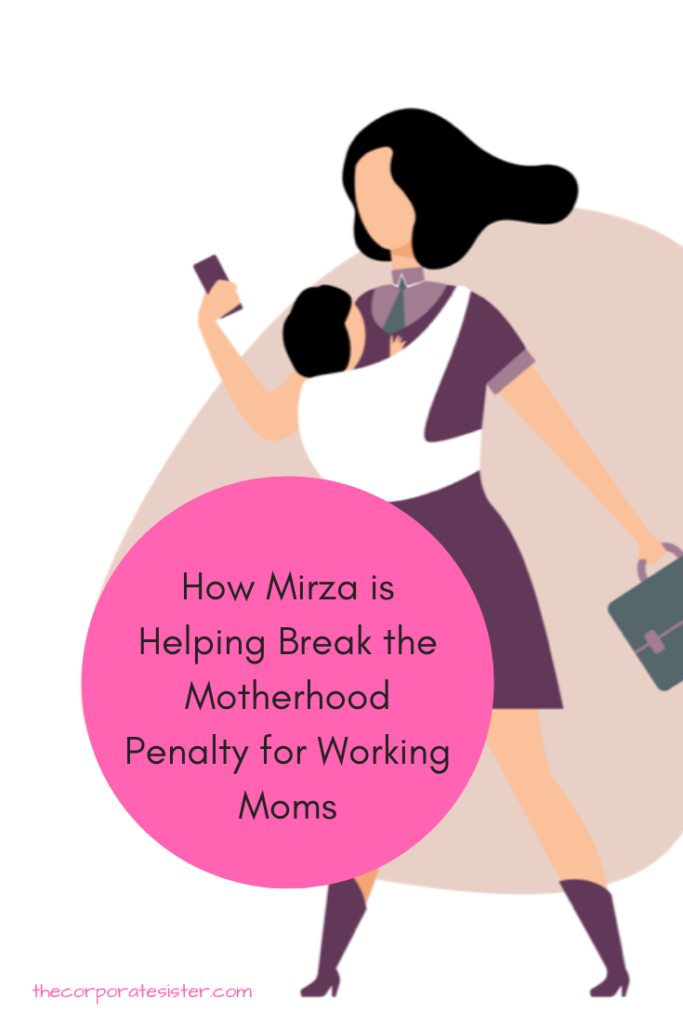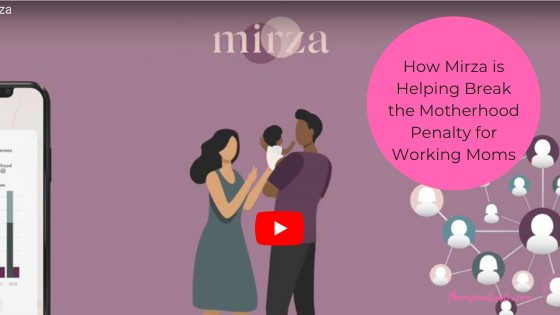Have you ever wondered if you’d ever had to choose between motherhood and your career? If you’d ever had to roll the dice to decide of the best time to have the baby, or go for the promotion, or even change career paths to have more flexibility? Like many, if not most working mothers, you may have had to ask yourself these harsh, heart-wrenching questions. If you have, then you may have very well deal with the proverbial motherhood penalty. I know as a working mom, I certainly have…
In honor of International Women’s Day this year, I’m shining the light on the motherhood penalty, or the high, and highly unfair price working moms have to pay to simply be…well, working mothers. Now more than ever, especially with the COVID-19 pandemic, women are having to bear the burden of being both caregiver and having full-time jobs. In addition, they’re also faced with escalating childcare costs, limited maternity leave, and general caregiving costs that keep climbing as time goes by. As a result of the worsening of these conditions through the pandemic, too many working moms have had to drop out of the workforce, at a record tune of 2.2 million women leaving their careers in 2020.
In this context, I’m honored to partner with the Mirza platform, dedicated to educating and empowering working parents around the cost of raising families. In a survey conducted last month, Mirza found 73% of women thought having a child would hold them back in their careers. Furthermore, Mirza just released a research study entitled Rolling the Dice: Breaking Down the Motherhood Penalty. This research is based on a 2018 study by the Institute for Women’s Policy Research, accurately titled Still a Man’s Labor Market, which investigated the gender pay gap over 15 years for the same men and women. By using a multi-year analysis, Mirza’s study found women actually earn $0.49 for every $1 that men make. Women who only took one year out of the workforce over this 15 year span saw their earnings dip 39% lower than women who worked straight through. This study confirms that women are literally rolling the dice professionally and biologically, at times having to start businesses or delay motherhood, which in and of itself can be a significant gamble.

To discuss the motherhood penalty in more depth, I’ve had the pleasure to interview Mel Faxon and Siran Can, co-founders of the Mirza Platform, on their journey creating the platform and their thoughts on the motherhood penalty:
Can you tell us about yourselves in terms of your professional background?
Mel: I am what you might call a “jack of all trades.” I graduated with a French and Foreign Affairs degree from UVA. I started out working in sports marketing, moved to a travel startup in Barcelona, worked at a James Beard award winning restaurant in Boston, worked for an EdTech startup in Denver, then was at a luxury travel startup for a few years before moving to London to get my MBA at London Business School. I’ve done sales, product management, process improvement, portfolio management, events, marketing – that’s the beauty of working in startups! You always get to do more than your job description and it’s a fantastic way to learn.
Siran: I was a Gender Studies major at Harvard and had expected to go into academia or nonprofit, but wanted to get some “real world” experience to bring to my work. What started as a short skills pursuit, learning management and operations, turned into a career. I built the driver support organization for Uber in New York and oversaw the support business for the US Northeast, was loving it, then life got in the way. My husband’s job moved us to London, where I got my Master’s in Social Business & Entrepreneurship at the London School of Economics. Hopefully Mirza is bringing it full circle now: integrating the work I wanted to do in women’s empowerment with the work I’ve enjoyed so much in my career.
2. What prompted you to start Mirza?
We are both of the Millennial generation of women, who have grown up being taught that “women can have it all.” But we’re also in a place where experts are projecting that it will take us another 108 years to achieve gender equality. Last January, we were talking about the obstacles that we and other women we know have faced, and really came down to “how can we be part of the solution?”
Our research brought us to the fact that the motherhood penalty is the leading cause of the gender pay gap, and after speaking with over 100 women, we realized just how much of a lack of resources there are around financial and career planning with this lens. By providing a tool for all parents, we are involving men – and that’s essential for actually changing things. We can’t keep continuing to put the onus on women to change things that are out of their control.
3. Motherhood penalty is the lesser known part of the wage gap. Can you tell us what the biggest issue with it is, and how it worsens the wage gap?
Absolutely! The motherhood penalty, or the steep decline in earnings a woman sees when she has a child, makes up 80% of the gender pay gap. What causes the motherhood penalty? A couple of things. The fact that we only offer maternity leave, instead of parental leave, so women default as the parent who takes time out of the workforce, and that compounds into huge financial losses in the long term. Women who took only one year out of the workforce earn 39% less than women who continue working straight through. We also don’t have PAID parental leave, so that’s a huge contributor. Infant care is also more expensive than public college in 33 states, so that financial strain on families tends to force one parent (usually the birth parent) to stay out of returning to work longer. Lastly, we still have a lot of cultural norms to overcome. The nuclear family dynamic is INGRAINED into the American psyche, and until we can get men on board to split parenting duties and household responsibilities equally, there’s only so much that structural change can do.
4. Would you agree the COVID-19 pandemic has increased the motherhood penalty? If so, how much and do you think we can recover?
Unfortunately, yes. Studies are showing that we’ve lost 30 years in progress towards gender equality. And studies are also showing just how hard women have been hit during COVID. 17% of working moms quit during the pandemic, and 1 in 4 of those still working plan to quit or downshift due to childcare needs.
The childcare piece is a key factor; so many centers were forced to close during the pandemic, and many of them closed permanently. Working parents are struggling to work, parent, and homeschool all at the same time – it’s why we’re seeing countless articles on burnout. The New York Times did a great series called The Primal Scream that really encapsulates this.
We’re facing the first “she-cession” and unless we pass litigation geared towards helping working moms and working parents, I don’t know how we do recover fully. Biden has proposed 12 weeks of paid parental leave, universal child care for three and four year olds and sliding scale childcare subsidies – we fully support this! But we need everyone to lobby behind it and get these proposals passed.
5. What were your findings in your research study entitled “Rolling the Dice: Breaking Down the Motherhood Penalty”?
So while we didn’t do our own research in this paper, we broke down and analyzed previously done studies to explain the motherhood penalty and the ramifications of delaying children. A 2020 study by Modern Fertility found that 49% of respondents were delaying having children, with many of them wanting to hit a certain milestone in their career – salary or level – before kids.
The main study we analyzed, by Liana Christin Landivar in 2020, was on the motherhood gap and first birth timing. The key takeaway is that for a select few, high wage, white-collar jobs, delaying children actually CAN help mitigate the motherhood penalty. However, for the majority of women, delaying children can actually cause more of a penalty. We flushed out the variance for four different professions, or the loss over a career of income based on delaying a child versus having one early.
We also wanted to highlight that while delaying a family can sometimes help professionally, it can also come with a very high physical cost. Our bodies are still made to have kids earlier, and the physical, mental, and financial toll of IVF is a serious side-effect of delaying.
At the end of the day, the most important thing to know is that this gamble women are making is NOT the answer. The answer lies in the structural changes we’ve already mentioned, and increasing labor force affiliation (i.e. telling women that it’s ok to love working).
6. How is Mirza helping working moms and working parents in general deal with the motherhood penalty and the wage gap in general?
Our app democratizes financial planning, the way it should be done: helping employees explore long term financial and family goals, with the compounding impact of years out of the workforce in mind. Parents access affordable childcare through our financial vehicle innovation (still in stealth mode!), and paired with our app to guide maximizing this new vehicle, unlock long term financial health.
On an individual level, by facilitating conversations between couples, we can help couples understand the long term impacts of their decisions around growing their family. We can help them visualize childcare, parental leave, and other decisions together, rather than defaulting to the birth parent taking time out of work/being the primary caregiver.
On an employer level, we can provide essential data to help improve retention of working parents as well as to help improve workplace policies for parents.
7. What is your best advice for working moms out there who may be afraid of rolling the dice between motherhood and career?
- Remember that you and your partner are a team! Reframe the mentality that “it would cost more than my salary after tax to pay for childcare.” You have a household income, and you both contribute to childcare
- Take the time to sit down and go through your values, career goals, life goals, on your own, then talk to your partner and build a plan to support each other as you grow your family. We made a great guide for this
- Plan ahead! The motherhood penalty is real, but having plans with your partner around who takes leave when, your childcare plan, and a plan with your employer BEFORE you take leave is essential. We’ve also made a great guide for that, here
- Talk to someone! We’ve built a community for parents, Mirza Connects, specifically for this – the ability to chat with other working parents about how they’ve navigated the same things. Your readers can join (for free!) here
It was such a pleasure learning more about the Mirza platform and its co-founders Mel Faxon and Siran Cao. For more information on the astounding and so necessary work they do, please visit Mirza and access their research report on Rolling the Dice: Breaking Down the Motherhood Penalty.







